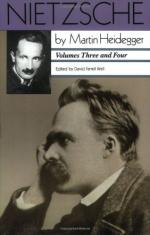|
This section contains 10,063 words (approx. 34 pages at 300 words per page) |

|
SOURCE: “Dostoevsky: The Nihilist Imagination,” in On the Dark Side of Russian Literature, 1709-1910, Peter Lang, 1987, pp. 145-81.
In the following essay, Ponomareff explores Dostoevsky's spiritual conflict and views the nihilist perspective as the defining characteristic of his fiction.
In his famous essay on Dostoevsky Freud made the culturally perceptive observation that the “compromise with morality” was “a characteristic Russian trait.”1 Dostoevsky's life fully corroborates this view and allows us to add to the study of the causal connection between a traditional moral ambivalence in the Russian writer and the nihilist consequences of this spiritual state on his spirit and his work. For, Dostoevsky began his life as a revolutionary and was in 1849 condemned to ten years of prison and exile in Siberia; but he ended his life, as Mochulsky has shown,2 a staunch conservative who enjoyed frequenting aristocratic salons and cultivated his friendship and connections with Pobedonostsev...
|
This section contains 10,063 words (approx. 34 pages at 300 words per page) |

|


